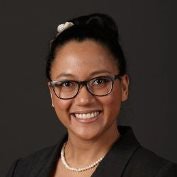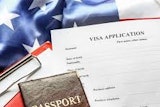I was very excited to come to George Mason University School of Law (GMUSL). I knew that GMUSL has a great legal writing program, which I know will be helpful in my career.
 Jacquelyn Branscomb is a law student at George Mason University School of Law.
Jacquelyn Branscomb is a law student at George Mason University School of Law.Also, as a Virginia resident, I knew I would be able to get in-state tuition. Cost and location were important factors for me since I work full-time in D.C. Coming to GMUSL, I knew that it wasn’t diverse. I looked at the ABA Required Disclosures available on the website prior to accepting and saw how low the numbers were for both minority students and faculty. It was disappointing as I knew that I may be one of the few Black or Asian students in my classes, especially since it is a smaller school, but I didn’t let that stop me from attending.
Throughout the school year, I noticed that the events and activities at GMUSL weren’t as diverse or inclusive for a public university. The diverse organizations are very small and minimally funded. Money went to events that typically had some sort of drinking like Oktoberfest, Casino Night, Thirsty Thursdays, Bar Study, Virginia Gold Cup, and St. Patrick’s Day. I don’t mind having those events, but I didn’t see much input from the student body to have at least some sort of effort for diversity and inclusion.
Sometimes it’s a battle for student organizations, especially diverse organizations to receive funding. It seemed difficult for diverse organizations to receive funding because some don’t see the relevance of diverse organizations to legal issues/education. Some thought that funding diverse organizations would only be used for social gatherings. When I was helping to restart the Asian Pacific American Law Student Association, I had a couple of students saying “well, there’s not a White Student Association.”
I’m not saying that there is no one on the faculty or in the administration that helps foster and support the diverse student community. I have had great support from members of the Career, Academic, and Alumni Services office and from the Admissions Office. I also have many classmates who are much more open to diversity issues. However, I can honestly say that it doesn’t appear to me as if diversity and inclusion are near the top of the list of the law school administration’s priorities.
Maybe as a result of the outcry from the renaming, things will change. My understanding, from the press release and from my interaction with some of the faculty, is that they pride themselves on the diversity of “ideas.” My understanding is that they pride themselves on not being a completely liberal thinking university as many other universities appear to be. It doesn’t appear to me that they are factoring in diversity of gender, race, ethnicity, disability, national origin, sexual orientation, or gender preference as others may presume with the term “diversity.”
There is a push to become one of the top law schools in the nation, by accepting this money and being able to bring in more students with higher GPAs and LSAT scores and more faculty. The money, however, comes with that name change. Yes, it is true that, at any law school, you will most likely have to read a Scalia opinion and many other writings by him. He had a significant impact on the legal landscape. However, his name comes with baggage that a number of students and alumni do not care to hold as our own.
Only a few months prior to the renaming, the oral arguments of the Fisher v. University of Texas at Austin case on December 9, 2015 made news where the late Justice Scalia provided controversial comments about whether increasing the number of Blacks at the University of Texas would be in the best interest of those Black students. His comments at the oral argument was not the first time he said something that may have offended a group in America. For someone as controversial as he was, I would have expected George Mason University and GMUSL to have more thought and input from current and past students, as well as the faculty and staff, prior to accepting this name change.
When the name change occurred, the admissions office did ask me if I wanted to reconsider my role as a Student Ambassador (speaking to admitted students). I volunteered at the first two Admitted Student Open Houses, but after the name change I responded that I was concerned about the impact of the name change on diversity issues at school.
I know the Dean has mentioned that the donation will help “improve diversity” at the law school but I’m not sure I’m on the same page as the dean and the rest of the administration on their meaning of diversity. The press release states:
The scholarships will help Mason continue to be one of the most diverse universities in America.
“When we speak about diversity, that includes diversity of thought and exposing ourselves to a range of ideas and points of view,” said [George Mason University President Ángel] Cabrera.
The students currently enrolled at the George Mason University School of Law and paid money to attend the George Mason University School of Law expected that name to be on our diploma and resume. A number of us did not expect to have such a controversial figure be the namesake of our school. When I go to events outside GMUSL, where other law students are at, I get a snicker or someone shaking their head or a question “you all agreed to that?” There are some supporters (or those who are indifferent) who try to compare our renaming to naming a football stadium “FedEx Field” but I don’t think that’s a fair assessment of the impact on current and past students. The name—whether we want it to or not—will follow us throughout our career. Many students were concerned about how their employment prospects in the future would be affected with the name Antonin Scalia on their resume or diploma.
I love my classmates and the staff at school. Now that the name change is official, my goal as a student (and in the future, as an alumnus) is to help make this law school a better, more diverse and inclusive school regardless of the name. We have a great opportunity to make this school better. The slogan seen throughout the school and on our website is “Learn. Challenge. Lead.” I want this to apply not only to the students of GMUSL, but to the Law School itself.
As a student I am asking my school to:
- Learn more about your students and alumni and more about diversity and inclusion in order to better prepare your students (and law school) for the future.
- Challenge yourself to be more diverse and inclusive, and to find ways to incorporate diversity into our legal education, in order to better prepare your students to serve the diverse clients of Virginia and America.
- Lead your faculty, staff, and students in understanding the importance of diversity and inclusion both at school and in the legal profession in general.
Jacquelyn Cabada Branscomb is a second year part-time law student projected to finish in May 2019. She is a Student Bar Representative for the 2nd year evening students, Board member of the newly reinstated Asian Pacific American Law Student Association (APALSA), and a member of the Black Law Student Association, Phi Delta Phi, and Phi Alpha Delta. She also volunteers with the Admissions Office for recruitment and for admitted student events.


















